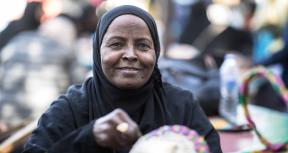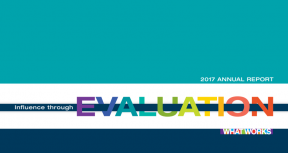Strengthening Client Evaluation Practice
IEG is a key player in supporting evaluators both in IEG and in client countries through several evaluation capacity development programs. IEG drives two capacity building initiatives, the International Program for Development Evaluation Training (IPDET) and the Centers for Learning on Evaluation and Results (CLEAR) Initiative. IEG also invests in the skills and capabilities of its own staff with the IEG Academy
NEW: World Bank Group Evaluation Principles
A highlight of FY19 was the release of the World Bank Group Evaluation Principles, co-led by the IEG Methods Adviser in collaboration with IFC, MIGA, and the World Bank. The principles act to solidify a Bank Group evaluation approach based on the evaluation framework established in FY18. The document delineates core principles for evaluation and underlying principles for planning, conducting, and using evaluations at the Bank Group. Informed by international evaluation principles and good practice standards, the common principles are designed to enhance development results by strengthening accountability and learning. The principles align the Bank Group’s evaluative efforts with global challenges and the Bank Group’s strategic focus; clarify the roles and responsibilities of key actors and encourage synergy among them throughout the evaluation process; and ensure that all Bank Group evaluations are robust, of high quality, and credible.
Evaluation Capacity Development
One important part of IEG’s mandate is to assist national, regional, and local governments, as well as civil society and nongovernmental organizations, in strengthening their monitoring and evaluation capacity in support of better designed public policies and increased accountability for results. This is particularly important in the context of the SDGs and Agenda 2030, which require governments to monitor progress and understand what accelerates advancement toward them.
CLEAR is a global network comprising six centers that provide M&E capacity building support in six different regions of the world. The objective is to deepen the M&E culture in these regions and help establish the needed legal and regulatory framework, systems, procedures, and skills. In FY19, CLEAR demonstrated its commitment to evaluation capacity development with projects in each region.
CLEAR also plays a strong advocacy role in promoting the use of evidence in policy making globally. In June 2019, CLEAR launched the gLOCAL Evaluation Week. This event recognized that today, more than ever before, global knowledge is shaping local evaluation practices, while at the same time, local experiences are contributing to strengthening global evaluation thinking. In this context, over 270 events were organized in more than 90 cities across 38 countries to share global and local M&E knowledge and experiences.
IPDET is a global executive program in M&E. In July 2019, IEG supported—with its partners the Center for Evaluation in Germany and the University of Bern, Switzerland—the second year of IPDET. This year’s program benefited from closer collaboration with partners and instructors from the Global South. A total of 230 participants from 85 countries took the course this summer to enhance their M&E knowledge and skills.
Methods Advisory
IEG’s methods advisory team aims to advise and influence IEG evaluators in implementing high quality methodological approaches in their evaluations and introducing methodological innovations within IEG. To that end, the methods advisory team worked with other IEG teams to apply a broader range of methodological approaches, including process tracing, social network analysis, Delphi techniques, structured literature reviews, and protocol-based portfolio analysis, in evaluations occurring in FY19. A highlight of FY19 involved the release of the World Bank Group Evaluation Principles, co-led by the IEG Methods Adviser. Finally, other work involves updating and developing methodological guidelines, unifying and professionalizing the work done by IEG’s data analysts, collaborating with World Bank monitoring and evaluation colleagues on bringing external experts to community of practice learning events (the Results Measurement and Evidence Stream), and guiding M&E training with the IEG Academy. Regarding the latter, the methods advisory team successfully organized and delivered courses for IEG staff (and, increasingly, with participation from colleagues from other international DC-based institutions such as the Inter-American Development Bank): Foundations of Evaluation Design; Theory of Change; and a number of Portfolio Review and Analysis training modules.
IEG Academy
In FY19, the IEG Academy took on its second year in full force. Two all-staff, dedicated Learning Days highlighted the importance of professional growth and development to IEG. Courses covered a wide range of topics, including the foundations of evaluation design, problem-solving techniques, and design thinking. In addition, over the course of the year, IEG Academy hosted 47 classes and provided on-the-job tools and coaching opportunities.
Maximizing Strategic Focus to Increase World Bank Group Effectiveness
In FY20, IEG will position itself to provide even greater impact by focusing on the development effectiveness questions that most concern the institution and its clients in terms of what is needed to influence country development outcomes and where the Bank Group can do more, differently, or better. IEG has aligned its work program with Bank Group strategic priorities, keeping in mind the Sustainable Development Goals, commitments made in the IBRD and IFC Capital Packages, and the themes of the IDA’s last two replenishments (IDA18 and 19).
To increase the benefits of its strategic topic selection, IEG will seek lessons from multiple angles at the country, client, and beneficiary levels and offer improved knowledge packaging and customized outreach for different audiences. For example, Country Program Evaluations will be geared toward maximizing their potential to inform the design of subsequent Country Partnership Frameworks while at the same time contributing to enhancing the Bank Group support for development impact more broadly. Demand-driven Learning Engagements will be held on M&E frameworks in FCV situations, the World Bank’s organizational effectiveness to deliver on its jobs agenda, and South-South exchanges. At the corporate level, IEG plans to provide timely inputs to the IDA19 midterm review and the IDA20 discussions by evaluating areas relevant to the IDA18 and 19 Replenishment Themes.
IEG will also increase its engagement throughout the evaluation life cycle to enrich content and use. Greater participation at the beginning of the process will provide evaluators with informed, contextual inputs. At the end of the cycle, the increased attention will boost uptake and allow evaluators to see their lessons put into play, providing more insights for future evaluations. All facets of Bank Group projects should be examined and learned from, but the most visible, and perhaps meaningful, of these is outcome. IEG will work closely with Bank Group management in FY20 to take the institution’s outcome orientation agenda to the next level. This means finding ways to generate better information on the results and impacts of Bank Group operations, extending beyond simple attribution to a concrete analysis of contribution, which will encourage an even stronger push for results. IEG will contribute by reviewing project-level validations and evaluations for quality, use, cost, methodology, and value.
Improving evaluation practice is a cornerstone of IEG’s work. In FY20, IEG intends to build on its unique position to bring technical experts together by expanding its role as an incubator of innovative practices and methods for evaluation. Overarching topics to tackle include systems approaches, case-based methods (especially in the context of causal analysis), using new data (for example, social media or geospatial data), and new approaches for data analytics and visualization. As IEG introduces more flexible approaches to answer strategic evaluation questions, it will adapt how it chooses to present its findings. FY20 will see shorter, more focused evaluative products and more willingness to consider different product styles designed for specific audience needs. We are excited to push the evaluation practice in a fresh, meaningful direction.









